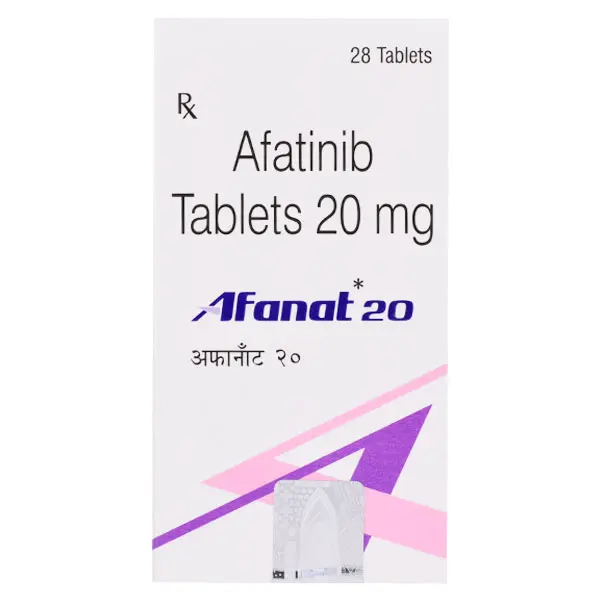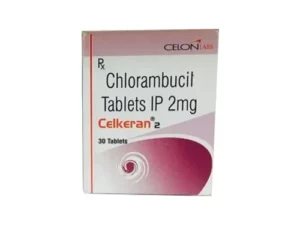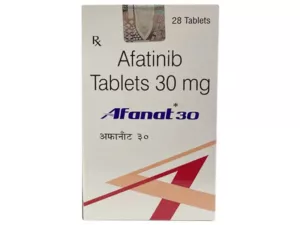Afatinib 20 mg: Complete Guide on Uses, Dosage, Side Effects, and Benefits
✅ Indications / Uses:
Afatinib 20 mg is primarily prescribed for the treatment of certain types of non-small cell lung cancer (NSCLC) and head and neck cancer. Specifically, it is used for:
- Non-Small Cell Lung Cancer (NSCLC):
- Afatinib is indicated for the first-line treatment of patients with EGFR mutation-positive non-small cell lung cancer (NSCLC).
- It is used in patients who have advanced or metastatic NSCLC.
- Head and Neck Cancer:
- It is used to treat patients with squamous cell carcinoma of the head and neck (SCCHN) that has recurred or metastasized after prior treatments, including chemotherapy.
- EGFR Mutation-Positive Cancers:
- It targets tumors with epidermal growth factor receptor (EGFR) mutations, which are common in some forms of lung and other cancers.
⚙️ Mechanism of Action:
Afatinib is a Tyrosine Kinase Inhibitor (TKI) that works by blocking the activity of epidermal growth factor receptors (EGFRs) on cancer cells. Here’s how it works:
- Inhibition of EGFR:
- EGFR is a receptor on the surface of cells that, when activated by growth factors, triggers signaling pathways that promote cell growth, survival, and division. In cancer cells, these pathways are often overactive, leading to uncontrolled cell growth.
- Afatinib binds irreversibly to EGFR, along with other related receptors like HER2, HER3, and HER4, blocking the signaling pathways that drive cancer cell growth.
- Blocking Tumor Growth:
- By inhibiting these pathways, Afatinib slows or stops the growth of cancer cells and can help shrink tumors, improving the symptoms and overall progression of cancer.
- Selective Targeting:
- It is particularly effective in patients with EGFR mutations that cause abnormal activation of the receptor. The drug works best in these cases because it directly targets the mutated receptors that drive tumor growth.
💊 Dosage and Administration:
Standard Dosage:
- Adults:
- The typical starting dose of Afatinib is 40 mg once daily, but this can be reduced to 30 mg or 20 mg depending on the patient’s tolerance and side effects.
- For advanced NSCLC with EGFR mutations, the dose is usually adjusted based on the patient’s response and tolerability.
- Head and Neck Cancer:
- Afatinib may be used in combination with other treatments like chemotherapy for patients with advanced or metastatic head and neck cancer.
Administration:
- Afatinib should be taken orally as a tablet, with or without food.
- The tablet should be swallowed whole with a glass of water. Do not crush, break, or chew the tablet.
- It is important to take the medication at the same time each day to help remember.
Note: It’s essential to follow the healthcare provider’s instructions and adjust the dosage as necessary, especially if side effects occur.
⚠️ Warnings and Precautions:
- Diarrhea:
- Afatinib can cause severe diarrhea. If left untreated, it can lead to dehydration or other serious complications. It’s important to manage diarrhea as soon as it occurs by following the doctor’s recommendations.
- Skin Reactions:
- Skin rashes, including acneiform rash, can occur. This side effect can be severe in some patients and should be monitored.
- Lung Problems:
- Interstitial lung disease (ILD), a serious lung condition, can develop during treatment. If shortness of breath, cough, or fatigue develops, patients should immediately contact their healthcare provider.
- Eye Problems:
- Some people may experience eye irritation, dryness, or inflammation, and it is essential to monitor any eye-related symptoms while on Afatinib.
- Heart Issues:
- Afatinib may cause heart problems or arrhythmias in rare cases. Patients with pre-existing heart conditions should be monitored regularly.
- Pregnancy Category:
- Afatinib is classified as Category D for pregnancy, meaning it may cause harm to an unborn baby. It should not be used during pregnancy unless absolutely necessary, and effective contraception should be used during treatment.
❌ Contraindications:
- Hypersensitivity:
- Afatinib should not be used in patients who have shown hypersensitivity (allergic reaction) to Afatinib or any of its components.
- Pregnancy:
- As mentioned, it should not be used during pregnancy due to potential risks to the fetus.
🔄 Drug Interactions:
Afatinib can interact with certain medications, including:
- CYP3A4 Inhibitors/Inducers:
- Drugs that inhibit or induce the CYP3A4 enzyme can affect Afatinib’s levels in the body, either increasing side effects or reducing effectiveness. For example, rifampin (an inducer) may decrease Afatinib’s effectiveness.
- Antacids and Proton Pump Inhibitors (PPIs):
- These drugs can reduce the absorption of Afatinib, potentially lowering its effectiveness. It is advised to separate the administration of these drugs by at least 6 hours.
- Other Chemotherapy Drugs:
- Careful consideration should be taken when using Afatinib with other chemotherapeutic agents, as side effects and interactions may occur.
🤰 Use in Pregnancy and Lactation:
- Pregnancy:
- Afatinib should not be used during pregnancy as it may harm the fetus. Women of childbearing age should use effective contraception during treatment and for a period after completing the therapy.
- Breastfeeding:
- It is unknown whether Afatinib passes into breast milk, so it should not be used while breastfeeding. Women are advised to discontinue breastfeeding during treatment.
⚠️ Possible Side Effects:
Common:
- Diarrhea
- Rashes (acneiform rash)
- Nausea and vomiting
- Fatigue
- Appetite loss
Serious but Rare:
- Interstitial lung disease (ILD)
- Heart problems (e.g., arrhythmias)
- Severe eye irritation
- Liver issues
🧊 Storage:
- Store Afatinib at room temperature (15–30°C).
- Keep it in a dry place and away from moisture, heat, or direct light.
- Keep out of the reach of children.
📝 Patient Counseling Tips:
- Take Afatinib at the same time each day to improve adherence.
- Manage diarrhea promptly by staying hydrated and following your healthcare provider’s guidance.
- Report any signs of lung problems or severe skin reactions to your doctor immediately.
- Use effective contraception if you are of childbearing age.
- Do not crush or chew the tablet; swallow it whole.









William (verified owner) –
Works wonders for boosting my immune system naturally.
Angel (verified owner) –
Noticeable immune boost, I feel more resilient against viruses.